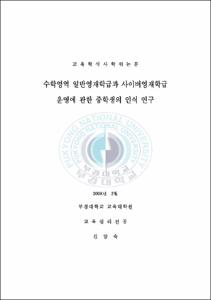수학영역 일반영재학급과 사이버영재학급 운영에 관한 중학생의 인식 연구
- Alternative Title
- A Study of middle school students' perceptions of On-line and Off-line Gifted Classes operation in mathematics
- Abstract
- The purpose of this study was to examine how secondary school students perceived the operation of on-line and off-line math-gifted classes in a gifted education institute under the umbrella of a local office of education, to find out about what problems there were with the way of managing those classes, and to lay the foundation for ensuring the rational and efficient management of gifted classes. It's ultimately meant to make a contribution to boosting gifted education in our country.
The research questions run as follows
1. How do students recognize the current situation concerning the operation of on-line and off-line mathematics classes in a local gifted education institute by gender, academic year and the field of gifted education?
2. How do students recognize the effect and satisfaction level of on-line and off-line mathematics classes in a local gifted education institute by gender, academic year and the field of gifted education?
3. How do students recognize the improvement of on-line and off-line mathematics classes in a local gifted education institute by gender, academic year and the field of gifted education?
The subjects in this study were 591 students who included 208 in on-line classes and 383 in off-line classes. After a survey was conducted with two different kinds of questionnaires that were respectively designed for on-line and off-line classes, the collected data were analyzed with SPSS 12.0/Win program. Statistical data on percentage and frequency were obtained by background variables involving gender, academic year and academic field, and x2-test was utilized.
The results runs as follows.
First, as for the managerial state of the gifted classes, the students who were enrolled in the on-line and off-line classes regarded gifted people as ones who had a superb ability in a particular field and as ones who think creatively. Concerning what they received gifted education for, some of them viewed gifted education as a means to enter special high school and college, which showed that the goal of gifted education, which was to boost national competitiveness, was overlooked. Since 2006, the Gifted Education Institute of Pusan Metropolitan City Office of Education has provided an opportunity for lots of students to receive cyber-gifted education at a small amount of budget, but that organization should channel more efforts into ensuring the success of on-line gifted education from various angles.
Second, in regard to the managerial effectiveness of the gifted classes and satisfaction level with them, all the students in on-line and off-line classes found gifted education to be of use to developing their potentials, and they had the biggest preference for experiential field study as the most effective teaching method. For instance, they had a liking for visiting different sports related to gifted education or meeting with scholars.
Specifically, cyber-correctional education allowed them to see repeatedly what they learned without being restricted by time and space, and that served to improve their mathematical knowledge and problem-solving skills. Yet on-line education was just in the rudimentary stage, and the efficiency of on-line education should be taken to another level by developing a wide variety of contents and providing students with good computers that aren't outdated.
Third, concerning their needs for the management of gifted classes, they asked for immediate Q&A services over the Internet. And unlike face-to-face instruction, it's not quite possible to observe the feedback of students in off-line class. So teachers should make a thorough preparation for that.
In particular, the gifted classes were managed in a stiff manner for the sake of the convenience of administration, and that made the students feel inconvenience in attending their school. The flexible management of gifted classes should be guaranteed not to give them any inconvenience when they take a test at school or participate in school events.
- Issued Date
- 2008
- Awarded Date
- 2008. 2
- Type
- Dissertation
- Publisher
- 부경대학교 교육대학원
- Alternative Author(s)
- Kim, Mal-suk
- Affiliation
- 부경대학교 교육대학원
- Department
- 교육대학원 교육심리전공
- Advisor
- 황희숙
- Table Of Contents
- Ⅰ. 서론 = 1
1. 연구의 필요성 및 목적 = 1
2. 연구 문제 = 4
3. 용어의 정의 = 4
Ⅱ. 이론적 배경 = 7
1. 영재의 개념 및 특성 = 7
2. 영재교육 = 10
3. 영재교육과 사이버교육간의 연계 = 21
4. 부산 지역영재교육원 영재학급 운영 현황 = 28
5. 선행연구의 분석 = 34
Ⅲ. 연구 방법 = 38
1. 연구대상 = 38
2. 연구 도구 = 39
3. 자료의 처리 = 41
Ⅳ. 결과 및 논의 = 42
1. 운영의 실태에 대한 학생의 인식 = 42
2. 운영의 효과 및 만족도에 대한 학생의 인식 = 53
3. 운영개선에 대한 바램에 대한 학생의 인식 = 71
4. 논의 = 83
Ⅴ. 요약 및 결론 = 87
1. 요약 = 87
2. 결론 및 제언 = 92
참고문헌 = 95
부록 = 101
- Degree
- Master
- Files in This Item:
-
-
Download
 수학영역 일반영재학급과 사이버영재학급 운영에 관한 중학생의 인식 연구.pdf
기타 데이터 / 887.43 kB / Adobe PDF
수학영역 일반영재학급과 사이버영재학급 운영에 관한 중학생의 인식 연구.pdf
기타 데이터 / 887.43 kB / Adobe PDF
-
Items in Repository are protected by copyright, with all rights reserved, unless otherwise indicated.